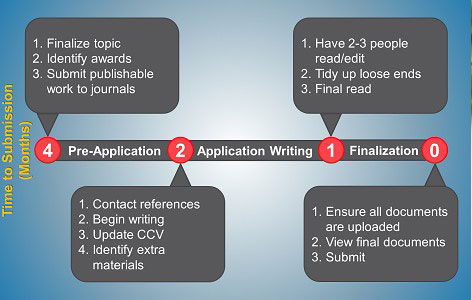
By: Tyler Saumur, UHN Trainee and ORT Times Writer
The sun is out, the birds are chirping, the smell of freshly cut grass is in the air. It’s finally that time of year—grant season (or award application season for trainees). With this being the last ORT Times issue before the summer, I have chosen to focus on some tips for writing award applications, which often commence in September.
First and foremost, find out how you are being evaluated, as you should tailor your application to play to your strengths and emphasize the items most heavily weighted in the reviewer’s rubric. Many funding bodies have key initiatives or five-year plans that can provide insight into the priorities of the organizations. Your submitted proposal should have an organic fit within the aims and scope of the organization and it should feel as natural as possible, and not forced.
Early on, you should reach out to your referees giving them ample time to provide you with a strong reference letter that will demonstrate how your characteristics exceed the reviewers’ expectations. When contacting your referees, you should provide them with pertinent details of your project and the award, allowing them to tailor your skills and experiences to fit the adjudication criteria.
Reviewers don’t spend very long on each application (6-8 minutes)1, so you need to be concise, attention-grabbing, and clear about the impact of your work. One way to do this is by using headings and white space to separate each section. This helps separate text and quickly draw readers to the subject of each paragraph. Another effective method to focus the reader’s attention is to bold keywords or the primary objective of your study; this will emphasize the importance of these points moving forward in the application.
Once a rough draft has been created, forward it to as many people as possible. Getting individuals naïve to your research to review your proposal will help strengthen the readability of your application. When you read your proposal aloud, the flow should be natural and continuous; if there is an area you trip over, it should be reworked to provide a seamless read. Providing yourself with adequate time between writing your work and finalizing it, has a two-fold impact. Firstly, time allows you to be more critical of yourself once you become less submersed within it; similarly, receiving feedback can be difficult, and time allows you to digest constructive criticism and wait until you feel comfortable with implementing certain changes.
Overall, time is the most important factor. Providing yourself with as much time as possible will ensure your strongest application will be submitted. A rough timeline to provide some guidance can be found below. Good luck with your applications and enjoy your summer.
Resources:
1. http://www.sgs.utoronto.ca/Documents/FALL2017-Awards-Info-Session-Slides...
2. http://www.sgs.utoronto.ca/Documents/Graduate+Awards+Eligibility+Chart.pdf

When possible, giving yourself at least four months to prepare for an award application will provide you with the time needed to publish your research and think about your topic to give you an added competitive edge. Image courtesy of: Tyler Saumur

